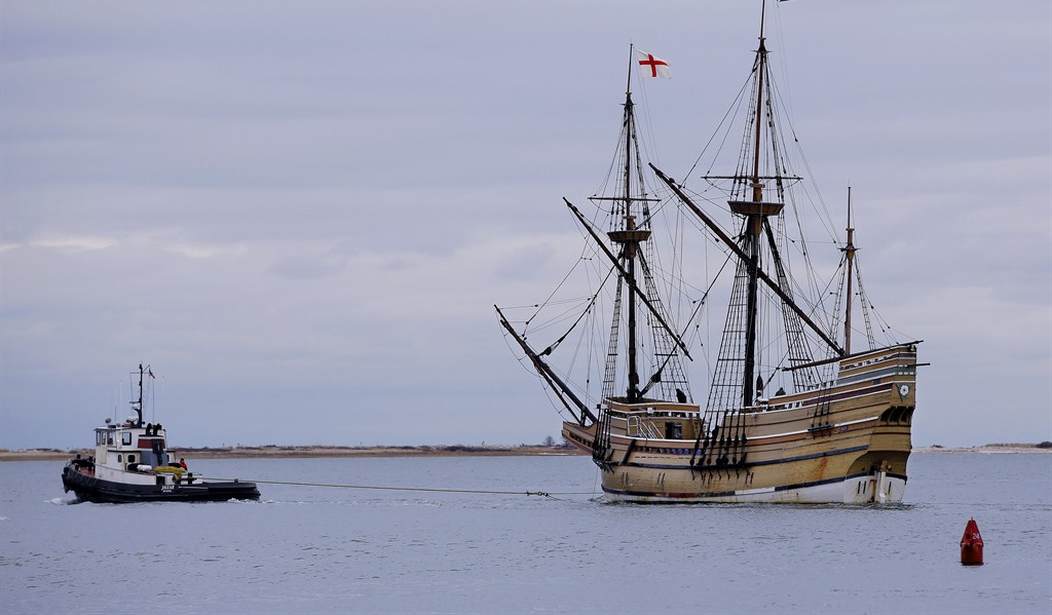As we get ready to celebrate another Thanksgiving, there's one more thing to be grateful to God for---the U.S. Constitution and the political freedom it has brought. What many people don't realize is the link between the Pilgrims, authors of our Thanksgiving tradition, and our nation's founding document.
When the founding fathers sat down in Philadelphia in the summer of 1787 at the Constitutional Convention, they had almost 150 years of constitution-making on American soil to draw from. And devout Christians of earlier generations, who used the biblical concept of covenant as a model, were those who provided the precedents.
One such document was the Fundamental Orders of Connecticut of 1639, which was inspired by a sermon that examined principles of government from the Bible. This covenant, which mentions "the gospel of our Lord Jesus," was the first complete constitution written on American soil and is the reason that to this day Connecticut is called "the constitution state."
A covenant is an agreement before God, binding a community together. The Pilgrims, Puritans, and other dedicated Christians engaged in writing about 100 various agreements for self-government, paving the way for the Constitution.
The first of these American covenants was written by the Pilgrims before they even disembarked the Mayflower, a month before they even set foot in Plymouth.
The Pilgrims had a charter from King James, who hated Christian dissenters and was glad they were leaving England, to settle in "the northern parts of Virginia." But they were blown off course and providentially hindered from sailing south of Cape Cod---at least for the winter.
Recommended
Because the Mayflower had been blown off course and was under no government's jurisdiction, Pilgrim leaders heard that some of their hired hands had a mind to strike out on their own and leave the colony before it even started. That would be disastrous.
So before disembarking, the Pilgrims decided to write up an agreement for self-government. It was a biblical type of covenant, calling on God as a witness and committing them all to a common purpose.
The Mayflower Compact says: "In the name of God, Amen. We whose names are underwritten, the loyal subjects of our dread sovereign lord, King James . . . Having undertaken for the glory of God, and advancement of the Christian faith, and the honor of our king and country, a voyage to plant the first colony in the northern parts of Virginia; do by these present, solemnly and mutually in the presence of God and one of another, covenant and combine ourselves together into a civil body politic, for our better ordering and preservation, and furtherance of the ends aforesaid."
This document signed on November 11, 1620 was a milestone in history and a major step in the process of the creation of America.
In A History of the English-Speaking Peoples, Winston Churchill calls the Mayflower Compact “one of the remarkable documents in history.”
Paul Johnson, author of A History of the American People, points out that the Mayflower Compact was “the single most important formative event in early American history, which would ultimately have an important bearing on…the American Republic.”
The great 19th century historian, George Bancroft, writes: “In the cabin of the Mayflower humanity recovered its rights, and instituted government on the basis of ‘equal laws’ enacted by all the people for ‘the general good.’”
Dr. Donald S. Lutz, a professor of political science at the University of Houston and the author of The Origins of American Constitutionalism, points out that the Bible provided the concept of the covenant. I once interviewed him for the television special, One Nation Under God, hosted by D. James Kennedy.
In reference to the Pilgrims, the Puritans, and early Christian settlers of British North America, Lutz told me: "These poor people came to the New World, they had the wrong technologies, their plows would not work, their houses that they constructed were inappropriate for the weather. All their technology was wrong, except for one technology they brought with them, which was the ability to use covenants to create communities. It was the perfect technology. It was the technology that mattered that allowed them to survive all up and down the coast."
Lutz speaks in his book of the importance of the “covenants that derive from the biblical tradition” in helping to frame, ultimately. the U.S. Constitution. And he adds, “When one reads the preamble, which begins ‘We the people...,’ it is difficult not to think of ‘We whose names are [underwritten]’ in the Mayflower Compact, the first political covenant in America.”
The Constitution and those, like the Pilgrims, who helped pave the way toward its creation, are blessings to be grateful for this Thanksgiving season. Thus endeth the history lesson. Happy Thanksgiving.
























Join the conversation as a VIP Member